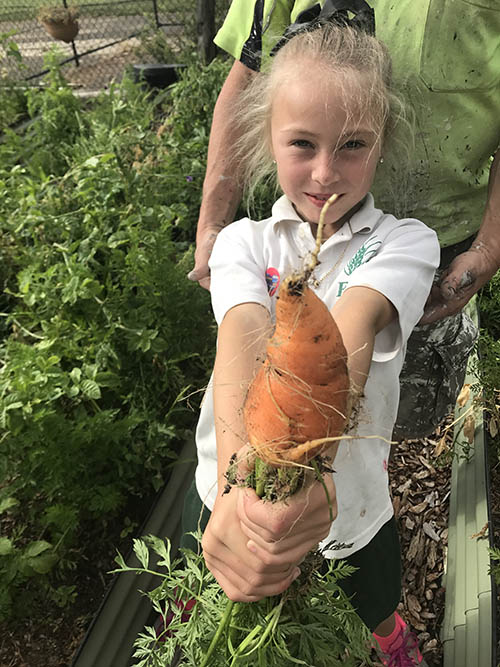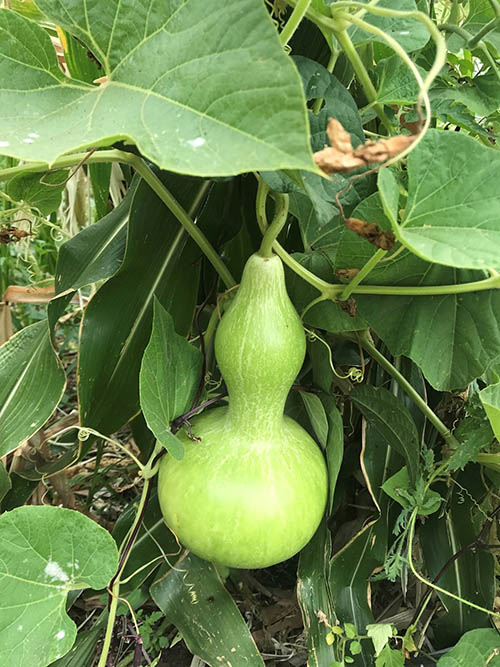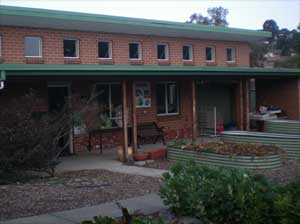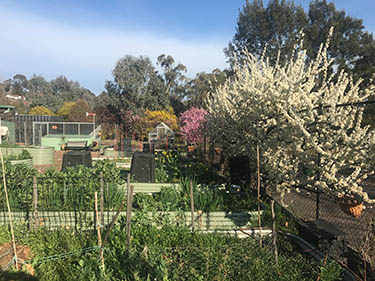Farrer Primary School is a 5 Star Waste Accredited school. The Environment Centre is the heart of our science and sustainability program and engages students by giving them responsibility for the animals, gardens and waste management at our school.
How the Environment Centre was established
· The Principal and staff saw a need for more wet areas for hands on science, horticulture and technology based activities.
· A committee of parents, teachers and community was formed.
· An architect parent designed the building to our specifications.
· There were three years of planning and fundraising.
· Families were encouraged to buy a brick or donate funds.
· The Environment Centre was built in 2000.
Overview of the Farrer Primary School Environment Centre
The Farrer Primary School Environment Centre includes the following aspects:
Students
Farrer students participate in lessons in the Environment Centre every week. Senior students are given leadership opportunities as Green Team or Clean Team members.
Year 6 Green Team students are responsible for animal care, garden planting and harvesting and presenting awards to students in who give their time to support sustainability at Farrer Primary School. Green Team students are expected to be responsible and reliable and are given specific leadership opportunities throughout the year. The culmination of the year is the Green Team bike ride. This bike ride is a full day bike riding excursion which shows students some of Canberra’s extensive bike paths and showcases bikes as a realistic alternative to cars.
The Year 5 Clean Team are responsible for specific waste initiatives at Farrer. They are responsible for managing yellow bin recycling in classrooms, return of lost property, educating the community about being waste free or waste responsible and celebrating Waste Wise Warriors.
Produce
Our garden produce is mostly eaten freshly picked by our students or given to the canteen. Most years we have a bumper crop of pumpkins and run a pumpkin raffle at our school. Our record yield is 59 pumpkins! We grow a range of species including super sized pumpkins.
Animals
Our Environment Centre is home to a range of animals which can range from fish to turtles and guinea pigs. The care of these animals is done by the students with teacher supervision. Caring for the animals provides students with experiences in being confident and respectful in their care whilst having direct involvement in animal life cycles, behaviours and temperaments. Students also learn about cycles of food by using our school food waste to feed our chickens and worms. They are able to directly see the benefits of our no waste approach through the eggs and fertiliser they provide.
Garden
Our gardens are planted and sustained by our students and parents and are there for the use of our school community. In 2014 our community raised funds to purchase a large greenhouse which has extended our planting times. It has allowed us to begin Spring crops early and provided us with the opportunity to grow seedlings to sell to parents, students and staff for use in their home gardens.
We have a Landcare volunteer in our local community, a Scientist in Residence, visiting experts in various fields of science and parent and grandparent volunteers who work with classes or in our gardens.
Our Environment Centre is often visited by teachers and students from other schools in Canberra or around the world. The ACTSmart Eco bus tour has visited several times to showcase the Environment Centre to groups of students and teachers who are seeking inspiration for their own school gardens. A delegation of Japanese science teachers visited in 2019 as part of a tour to observe how science and sustainability is taught in Australian schools.
Food
Our produce is eaten fresh from the gardens, used in science or taken to the canteen to provide fresh produce with no food miles. Providing fresh produce for our canteen reduces our costs, is an environmentally friendly action and exposes students to a range of food options. Our school is a Fresh Tastes school. Our teachers are able to source produce from our gardens to support cooking and nutrition lessons.


Environmental Science
Our Environment Centre is used as the focus of our chemistry, biology, physics and sustainability programs. Lessons are based on real life science. Students are engaged in discussions and experiments referencing current events like advancements in space programs, pandemics and disease, discoveries of new forms of life and vehicle crash safety.
Carol Edwards is an entomologist and our school's Scientist in Residence. Carol is the 2019 Public Service Volunteer of the Year for her work at Farrer Primary School and other Canberra schools. Carol has been involved with our school for a number of years as a parent and scientist and works with our senior students to provide extension opportunities and links to real world science. She advises and organises our garden planting and pest eradication ensure our school gardens are successful. Carol has been delivering her ‘butterfly talk’ to our year two students for years and is notorious for enlightening our students to the fact that honey is ‘bee vomit’!
Looking at Sustainability
Our seasonal planting helps students to understand what it means to eat 'in season' food and why 'food miles' are important to consider. By participating in planting and cropping, our students are shown the value of fresh food and the work that goes into producing it. Students are able to see first hand how important nutrients are for healthy gardens and participate in recycling our food scraps, worm castings, chicken manure and our vast number of school leaves through our garden system.
Our science program demonstrates the importance of science in sustainability. Students participate in experiments about plastic persistence in marine environments, the impact on plant growth of liquids we pour down our sinks, debates about green energy vs fossil fuels and other real life sustainability issues that students can take personal responsibility for.
'Sustainability addresses the ongoing capacity of Earth to maintain all life.'
Sustainable patterns of living meet the needs of the present without compromising the ability of future generations to meet their needs. Actions to improve sustainability are both individual and collective endeavours shared across local and global communities. They necessitate a renewed and balanced approach to the way humans interact with each other and the environment.
Education for sustainability develops the knowledge, skills, values and worldviews necessary for people to act in ways that contribute to more sustainable patterns of living. It enables individuals and communities to reflect on ways of interpreting and engaging with the world. Sustainability education is futures-oriented, focusing on protecting environments and creating a more ecologically and socially just world through informed action. Actions that support more sustainable patterns of living require consideration of environmental, social, cultural and economic systems and their interdependence.' (Australian Curriculum – Sustainability)
Crop / Plant Management
The students become involved in and develop an understanding about, crop management. For example
- Having winter and summer crop rotations as well as yearly crop rotations to ensure soil health and pest reduction. Our large number of beds allows us to plant a range of fruits and vegetables which benefits soil health and attracts beneficial pollinators and insect predators.
- Some of our produce is used for seed saving for re-use in future years. This has resulted in some interesting cross bred popcorn and pumpkins in our gardens.
- Students participate in soil health improvement through composting, mulching and use of animals castings.
Examining and Maintaining Habitats
Our Environment Centre has been extended to include a carbon forest planted by our students. It has now grown to a stage where insect and bird life are able to find shelter and food. Students use this area to explore properties of eucalypts, compare life forms found in different eco-systems and enjoy spending time amongst the trees.
Our preschool has been working with Aboriginal planting advisors to replenish their gardens with native plant species, both edible and beautiful. Establishing native plantings in and around our school educates students about the beauty and resilience of Australian species and supports native bird and insect species.
Creating and Using a Natural and Sustainable Cycle
Students actively and regularly undertake:
- Care of the garden beds such as weeding and turning the soil;
- Planting and maintaining seeds and seedlings in pots and the greenhouse;
- Planting and caring for seedlings in the main beds;
- Harvesting plants and gathering eggs;
- Eating the produce which is used in the canteen; and
- Continuing the cycle of re-investing nutrients through green waste management by saving food scraps for the chickens and worms, composting crops and leaves at the end of the season and using animal castings.

The Farrer Primary School Environment Centre classroom

The Farrer Primary School Environment Centre garden
No Term Letters were uploaded now
